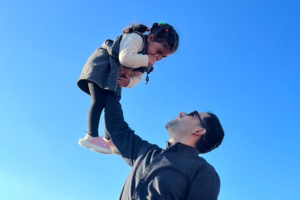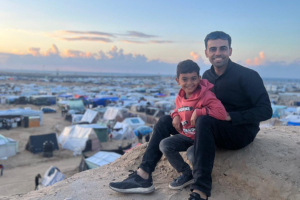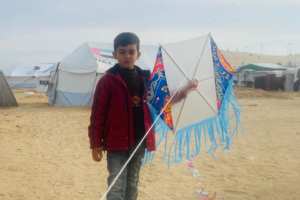Amr is a media officer with the Palestine Red Crescent Society. Like many of his colleagues, his family has been impacted by the ongoing conflict. We first introduced Amr after his family fled the north of Gaza to Khan Younis. We connected with him again, following yet another relocation.
Separated by conflict – reunited by relatives
The evacuation order came for Khan Younis, which left Amr and his extended family with yet another difficult choice. Move again to an area where they know no one, or stay. In the wake of unrelenting explosions, the family decided to evacuate.They knew they would need to cross a series of check points, so they started early in the day. There was bombing along the way and, amid the chaos, Amr was separated from his wife and children, 7-year-old Adam, and 3-year-old Maria. They couldn’t find each other in the crowds of people. There was no cell phone, Wi-Fi, or other signal.
“This was the worst time ever. For more than 12 hours I had no idea about my wife and my kids. I tried to ask hospitals if they got injured or killed,” said Amr through WhatsApp a week later a week later.

Because the signal was so bad, Amr used friends and relatives in the West Bank as a relay, hoping someone could connect and let him know about his wife and children. One night, just after 10 p.m., he got the call. Relatives had spotted his family. They were now all staying together. Everyone was okay.
After reconnecting with his family, they continued their treacherous journey.
“It was very, very unsafe, but we managed to get to Rafah,” said Amr.
Navigating a new reality: from house to tent
Now he and his family, including parents and in-laws, are trying to adapt to their new reality.“Living in a tent in such situations is very terrifying. You feel every bullet is directed to your body,” said Amr. “We are terrified and each of us checks on our children and loved ones. Living in a tent made of fabric makes you feel like the weakest creature on earth.
 Amr and his family are making everything by hand, setting up a bathroom, kitchen, and places to sleep and store water. Access to food remains difficult. Prices have more than tripled since the escalation of the conflict. Meat was $16 before; now it’s more than $50, assuming it’s even available. Amr says his family cannot afford it, so they eat canned food.
Amr and his family are making everything by hand, setting up a bathroom, kitchen, and places to sleep and store water. Access to food remains difficult. Prices have more than tripled since the escalation of the conflict. Meat was $16 before; now it’s more than $50, assuming it’s even available. Amr says his family cannot afford it, so they eat canned food.“It’s not easy at all to move from a well-equipped house to a very far place in a tent where there is nothing set up.”
His children are struggling. Adam lost his friend after an explosion across the street damaged the house where he was staying. Maria is confused as to why they have to keep moving.
Amr mostly thinks about the future.
 “We keep talking about what happened earlier and where will we stay after the conflict ends. I believe that all of us will continue our life in tents and all of this will last for a long time, maybe years,” he said. “I do not want my children to continue dreaming about the scene of soldiers, tanks, shooting and the terrifying sound of bombing.”
“We keep talking about what happened earlier and where will we stay after the conflict ends. I believe that all of us will continue our life in tents and all of this will last for a long time, maybe years,” he said. “I do not want my children to continue dreaming about the scene of soldiers, tanks, shooting and the terrifying sound of bombing.” People wishing to help are encouraged to donate to the Middle East Humanitarian Crisis Appeal.

